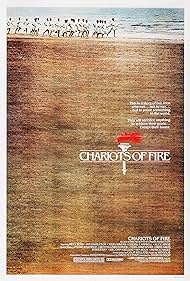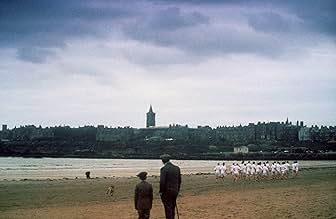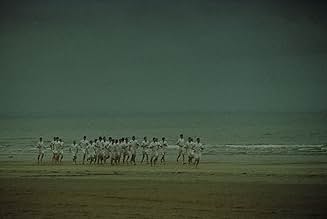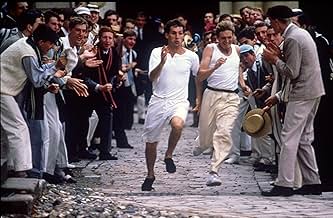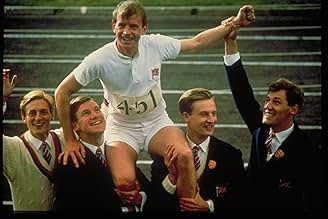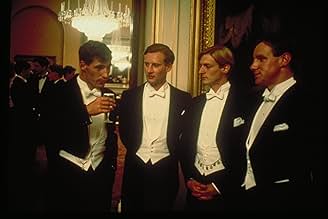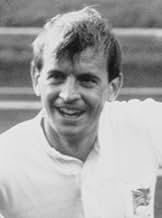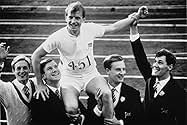Two British track athletes, one a determined Jew and the other a devout Christian, are driven to win in the 1924 Olympics as they wrestle with issues of pride and conscience.Two British track athletes, one a determined Jew and the other a devout Christian, are driven to win in the 1924 Olympics as they wrestle with issues of pride and conscience.Two British track athletes, one a determined Jew and the other a devout Christian, are driven to win in the 1924 Olympics as they wrestle with issues of pride and conscience.
- Won 4 Oscars
- 18 wins & 19 nominations total
John Gielgud
- Master of Trinity
- (as Sir John Gielgud)
- Director
- Writer
- All cast & crew
- Production, box office & more at IMDbPro
Featured reviews
Perhaps the most moving of all movies that I have ever seen, Chariots of Fire is purely amazing. I must admit that when I first saw it back in '97, I was bored silly by it, but then again, all the movies that I was watching then were your typical fare for a young teen--Adam Sandler comedies (how asinine they are now). Now, I have a great respect for CoF, since I discovered the joy of running and the feel of the race. Before every cross country and track season, I force my teammates to sit down and watch this to help learn what teamwork means and the glory of striving your hardest. Oh and that soundtrack is also pretty good.
I beg to differ with several previous reviewers. This film is neither bland nor is it solely about professionalism vs. amateurism.
This film is about what drives people to do what they do. Eric Liddell (Ian Charleson) runs for the glory of God, whereas Harold Abrahams (Ben Cross) runs to prove his worth to a society that was anti-Semitic. Even though they run for different reasons, their drive and determination spur them on. They stand up for what they believe in and refuse to sacrifice their principles because it is the easy way out.
The supporting cast is also extraordinary, with Nigel Havers, Nicholas Farrell, Ian Holm and Sir John Gielgud all making important contributions to the final product.
There is absolutely nothing unnecessary in this film. The writing, the direction, the acting, the dialogue are all outstanding. And then there's that haunting score.
Once again, this is truly an outstanding film. One with universal themes that transcend time and place.
This film is about what drives people to do what they do. Eric Liddell (Ian Charleson) runs for the glory of God, whereas Harold Abrahams (Ben Cross) runs to prove his worth to a society that was anti-Semitic. Even though they run for different reasons, their drive and determination spur them on. They stand up for what they believe in and refuse to sacrifice their principles because it is the easy way out.
The supporting cast is also extraordinary, with Nigel Havers, Nicholas Farrell, Ian Holm and Sir John Gielgud all making important contributions to the final product.
There is absolutely nothing unnecessary in this film. The writing, the direction, the acting, the dialogue are all outstanding. And then there's that haunting score.
Once again, this is truly an outstanding film. One with universal themes that transcend time and place.
What an amazing movie it is... amazing is the word! I saw the movie today - on the 5th of Feb '09. What a pity that i couldn't experience the movie's aura earlier!
Chariots of Fire is an outstanding piece of work which may be easily, and deservedly so, termed as LEGENDARY! Watch this movie and you'll know what is inspiration and dedication...
The characterization is such exemplary that each and every character tell their own little story... The two main characters - Lindell and Abrahams - are such that you'll only want to know them better as you go on watching the movie... especially that of Lindell. The guy is so so dedicated and truthful that i for one would just feel honored to know him closely.
Guys, WATCH IT!!!!!!!!!!!!
Chariots of Fire is an outstanding piece of work which may be easily, and deservedly so, termed as LEGENDARY! Watch this movie and you'll know what is inspiration and dedication...
The characterization is such exemplary that each and every character tell their own little story... The two main characters - Lindell and Abrahams - are such that you'll only want to know them better as you go on watching the movie... especially that of Lindell. The guy is so so dedicated and truthful that i for one would just feel honored to know him closely.
Guys, WATCH IT!!!!!!!!!!!!
This is a movie that fascinates me for a variety of reasons: the Edwardian attitudes in a time of moral upheaval (post-WWI), the contrast between a "muscular Christian" and a man running to beat the anti-Semitic bias of his time, etc. Because the movie asserted that it is "A True Story" I figured it would be fun to find out more about the various characters. What a disillusionment. The more I was able to find out the facts, the more the central conflicts in the movie fell apart. Harold Abrahams, while he did hire a professional trainer, was considered one of the most popular students at university and, if he was snubbed, it didn't bother him much. He certainly wasn't motivated to run by any anti-Semitism he encountered. He didn't meet He didn't meet Sybil Gordon until after his career was ended by a broken leg while demonstrating the long jump for reporters. His good friend and roommate, Aubrey Montague, turned out to be a rival runner at Oxford, who once wrote his mother after losing to Abrahams that he hoped Abrahams' Cambridge teamates, who had triumphantly carried him off the field, would drop him and break his leg. (The two became friends later in life, when they served together in amateur athletic organizations.) Abrahams was not the first runner to beat the school clock chimes; that was done by a brash aristocratic sprinter whose personality resembles the entirely fictional Lord Lindsay in the movie.
Eric Lidell was aware months before the team left for Paris that heat was scheduled for a Sunday and was always slated to run in the 400 -- no last minute switch to avoid running on the Sabbath. (Something like what was depicted did happen in the 1912 Olympics, but the runners were Americans from Penn, if I recall correctly.) Jennie Lidell never discourage Eric from training for Olympics. Jackson Scholz barely met Eric Lidell and never gave him an encouraging note. (I talked to Scholz by phone before he died at his home in Del Ray Beach and he told me that if he had given Lidell a note it wouldn't have been a biblical quotation because "my religious training was, well, a little casual.")
Scholz and Jennie Lidell, who were listed as technical advisers to the movie, were both more than a little offended by the inaccuracies in the movie and Scholz refused to see it because he felt it portrayed the Americans as overbearing and egotistical; he said that, in reality, "you couldn't have wanted to meet a bunch of nicer guys."
Does it matter? Probably not, but if it doesn't, why pretend the movie is true? Why not "based on actual events," or something of that sort? It really takes something away from the movie when you realize that none of the main characters had any of the personal, social or religious motivations the movie relies on to create drama. It makes one wonder what really motivated the real characters. I wrote and called Colin Welland a few times, but he never responded.
I still enjoy the movie, but now it's about a bunch of fictional characters, about whom it's harder to feel much interest. Sort as if one learned that Becket was, in fact, not killed by Henry II's barons, but was merely mugged in the park. Somehow the movie wouldn't be the same afterwards.
I wonder what kind of a movie could have been made about the real characters and events of the 1924 Olympics?
Eric Lidell was aware months before the team left for Paris that heat was scheduled for a Sunday and was always slated to run in the 400 -- no last minute switch to avoid running on the Sabbath. (Something like what was depicted did happen in the 1912 Olympics, but the runners were Americans from Penn, if I recall correctly.) Jennie Lidell never discourage Eric from training for Olympics. Jackson Scholz barely met Eric Lidell and never gave him an encouraging note. (I talked to Scholz by phone before he died at his home in Del Ray Beach and he told me that if he had given Lidell a note it wouldn't have been a biblical quotation because "my religious training was, well, a little casual.")
Scholz and Jennie Lidell, who were listed as technical advisers to the movie, were both more than a little offended by the inaccuracies in the movie and Scholz refused to see it because he felt it portrayed the Americans as overbearing and egotistical; he said that, in reality, "you couldn't have wanted to meet a bunch of nicer guys."
Does it matter? Probably not, but if it doesn't, why pretend the movie is true? Why not "based on actual events," or something of that sort? It really takes something away from the movie when you realize that none of the main characters had any of the personal, social or religious motivations the movie relies on to create drama. It makes one wonder what really motivated the real characters. I wrote and called Colin Welland a few times, but he never responded.
I still enjoy the movie, but now it's about a bunch of fictional characters, about whom it's harder to feel much interest. Sort as if one learned that Becket was, in fact, not killed by Henry II's barons, but was merely mugged in the park. Somehow the movie wouldn't be the same afterwards.
I wonder what kind of a movie could have been made about the real characters and events of the 1924 Olympics?
I watched this again last night. I had forgotten just how beautifully done it was - both a character study of two very different men and a gripping plot of their attempts to succeed - partly through athletics. the writer and director so well convey both Cambridge and the Edinburgh Presbyterian missionary disciples, in the early 1920s so very well.
The acting is superb - I had never seen a character presented like Eric Liddell in movies - how fine Ian Charleson was in this role, the softness of his voice, his ease and joy in running competitively (especially in contrast with the tense tortured Harold Abrahams). I also loved the more supporting roles - I've read a biography of F.E. Smith and Nigel Davenport is exactly how I would imagine him. The actor who played the Prince of Wales also seemed exactly right with his effortless charm, looks, and lack of imagination. Ian Holm, John Gielgud, Lindsay Anderson - all wonderful.
The actors weren't chosen for glamour either - Liddell and Abrahams are not Leni Riefenstahl images of athletic ideals, Liddell's sister is no beauty - and Abrahams' girlfriend is pretty but not stunning. It made them seem more real. (In nice contrast were the near-pretty boy looks of Nigel Havers as Lord Lindsay - it so suited his character).
The races are riveting - partly due to the music and sound effects.
So many small things are done so well - e.g., when Lord Lindsay has the confidence of his class to barge into a room containing the Prince of Wales, and three other lords (including Birkenhead and the head of the British Olympic Committee) and greets them by name - no need for introduction there (as there was for Liddell). It's small but seems quite real.
As an American, it was interesting and funny to see our Olympic team shown as the numerous, ominous, invulnerable "other"! (something like watching a Rocky movie with Rocky as the product of a Russian or East German success machine!). In fact, the one scene that seemed a bit off was the scene of the American track athletes warming up for the Games - all heavy music, machine like athletes, ferocious coach yelling with a megaphone into people's ears. It pounded too hard on the "these are the scary almighty inhuman opponents" theme in contrast to the cheerful British boys running along the beach.
Something I had forgotten about the movie was how stubborn BOTH protagonists are - Liddell fully as much as Abrahams. Liddell is not overly deferential or bashful when dealing with the Prince of Wales - but instead straightforward and very firm.
I truly can't understand anyone not liking this movie - it is very exciting even on the basic level of "will they win?" and so much more. (For example, Ian Holm's character's reaction to success after 30 years is very moving). Those who write to say that "Reds" deserved the Oscar more - are simply wrong. (Reds was so simplistic that it felt like watching the movie "The Hardy Boys Go to the Russian Revolution"). Those who say they cannot differentiate among the boys or between the Scottish and English accents - well, it sounds like some political statement to me.
Do watch it - it's very fine, very moving, very exciting.
The acting is superb - I had never seen a character presented like Eric Liddell in movies - how fine Ian Charleson was in this role, the softness of his voice, his ease and joy in running competitively (especially in contrast with the tense tortured Harold Abrahams). I also loved the more supporting roles - I've read a biography of F.E. Smith and Nigel Davenport is exactly how I would imagine him. The actor who played the Prince of Wales also seemed exactly right with his effortless charm, looks, and lack of imagination. Ian Holm, John Gielgud, Lindsay Anderson - all wonderful.
The actors weren't chosen for glamour either - Liddell and Abrahams are not Leni Riefenstahl images of athletic ideals, Liddell's sister is no beauty - and Abrahams' girlfriend is pretty but not stunning. It made them seem more real. (In nice contrast were the near-pretty boy looks of Nigel Havers as Lord Lindsay - it so suited his character).
The races are riveting - partly due to the music and sound effects.
So many small things are done so well - e.g., when Lord Lindsay has the confidence of his class to barge into a room containing the Prince of Wales, and three other lords (including Birkenhead and the head of the British Olympic Committee) and greets them by name - no need for introduction there (as there was for Liddell). It's small but seems quite real.
As an American, it was interesting and funny to see our Olympic team shown as the numerous, ominous, invulnerable "other"! (something like watching a Rocky movie with Rocky as the product of a Russian or East German success machine!). In fact, the one scene that seemed a bit off was the scene of the American track athletes warming up for the Games - all heavy music, machine like athletes, ferocious coach yelling with a megaphone into people's ears. It pounded too hard on the "these are the scary almighty inhuman opponents" theme in contrast to the cheerful British boys running along the beach.
Something I had forgotten about the movie was how stubborn BOTH protagonists are - Liddell fully as much as Abrahams. Liddell is not overly deferential or bashful when dealing with the Prince of Wales - but instead straightforward and very firm.
I truly can't understand anyone not liking this movie - it is very exciting even on the basic level of "will they win?" and so much more. (For example, Ian Holm's character's reaction to success after 30 years is very moving). Those who write to say that "Reds" deserved the Oscar more - are simply wrong. (Reds was so simplistic that it felt like watching the movie "The Hardy Boys Go to the Russian Revolution"). Those who say they cannot differentiate among the boys or between the Scottish and English accents - well, it sounds like some political statement to me.
Do watch it - it's very fine, very moving, very exciting.
Oscars Best Picture Winners, Ranked
Oscars Best Picture Winners, Ranked
See the complete list of Oscars Best Picture winners, ranked by IMDb ratings.
Storyline
Did you know
- TriviaWhen Colin Welland completed his first draft, the only title he could come up with was "Runners". Then, one Sunday evening he turned on BBC's religious music series Songs of Praise (1961), featuring the hymn "Jerusalem," with lyrics from a poem by William Blake. The chorus included the words "Bring me my chariot of fire". The writer leaped to his feet and shouted to his wife, "I've got it, Pat! 'Chariots of Fire'!" (The "Jerusalem" hymn is featured at the beginning and end of the movie.)
- GoofsWhen signing an autograph for a young fan, Eric Liddell does not unscrew or remove any cap from the pen he uses. As all fountain pens have caps, he seems to be using a modern day ballpoint pen which was not invented until 1938.
- Quotes
Eric Liddell: I believe God made me for a purpose - but He also made me fast. And when I run, I feel His pleasure.
- Alternate versionsThere is at least one slightly different version of the movie, issued in Europe on homevideo. The beginning is different - shorter - and introduces Harold Abrahams while playing cricket with his colleagues. The scene in the train station, where Monty meets Harold is absent, as well as the loading of the baggage in the taxi they share. We simply see Monty writing a letter to his parents, mentioning that "Harold is as intense as ever" (cut to the cricket scene, maybe 30 seconds long), and then continues with "I remember our first day... we shared a taxi together" (cut to the two students unloading their stuff from the car). This alternate version also have slightly different end credits, and does not mention Harold marrying Sybil. The differences are minor (the U.S. version provides a more shocking memento of WWI, when it shows crippled baggage handlers in the station); one of the reasons the cricket scene was dropped in favour of the station one was due to the distributor's worry that the American market would not understand it.
- ConnectionsFeatured in Vangelis: Chariots of Fire (1981)
- SoundtracksHe is an Englishman
(1878) (uncredited)
from "H.M.S. Pinafore"
Music by Arthur Sullivan
Lyrics by W.S. Gilbert
- How long is Chariots of Fire?Powered by Alexa
Details
- Release date
- Country of origin
- Languages
- Also known as
- Carros de fuego
- Filming locations
- The Oval Sports Centre, Bebington, Merseyside, England, UK(Olympic Stadium)
- Production companies
- See more company credits at IMDbPro
Box office
- Budget
- $5,500,000 (estimated)
- Gross US & Canada
- $58,972,904
- Opening weekend US & Canada
- $68,907
- Sep 27, 1981
- Gross worldwide
- $59,317,376
- Runtime2 hours 5 minutes
- Color
- Sound mix
- Aspect ratio
- 1.85 : 1
Contribute to this page
Suggest an edit or add missing content

